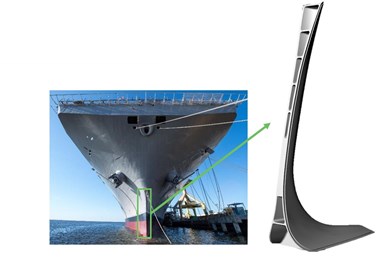Navy Awards $1.5M Contract for Meld Technology for Metal Printing, Repair
Program will further the Navy’s ability to support critical operations by delivering instructions and training for repair and printing of naval metal parts on site at the shipyard.

The Meld solid-state 3D printing process was chosen by the National Shipbuilding Research Program to reduce the lead times and efficiency of large steel castings like this ship stem bar.
Meld Manufacturing Corp., developer and provider of Meld 3D printing machines for metal, has been awarded a contract from the U.S. Navy following success in demonstration of printing metals and parts of interest.
The program supports the development of qualification data for Meld-created parts, which will guide naval use of Meld equipment. The contract includes the purchase of a Meld L3 model machine which will be housed in the Navy’s Center of Excellence for Additive Manufacturing at the Norfolk Naval Shipyard in Virginia. The program will further the Navy’s ability to support critical operations by delivering instructions and training for repair and printing of naval metal parts on site at the shipyard.
“We’ve received requests for a number of parts in a wide range of metal alloys from the Navy and shipbuilders that are not able to be printed with any other technology,” says Dr. Chase Cox, Meld Manufacturing’s director of technology.
The program will demonstrate repair of legacy and obsolete parts as well as the ability to print new parts critical to the modernization of the Navy’s fleet. Meld’s ability to both repair and print parts helps overcome long lead times for forged and cast products. The company says the L3 machine will provide the Navy with flexibility to use multiple materials and preserves the ability to create and repair parts with newly designed alloys.
The current contract builds on other naval investments, including those by the National Shipbuilding Research Program for “Scaling Up 3D Printed Steel Castings.” The Meld technology can help users solve the problem of long lead times for forged and cast metal products and provides large scale components in all metals. The Meld process for creating and repairing metal components uses off-the-shelf material in open air to print fully dense parts.
Related Content
-
ConocoPhillips Sees Oil and Gas Supply Chain Opportunity With Additive Manufacturing
Production of parts when needed and where needed can respond to the oil and gas sector’s multibillion-dollar challenge of holding parts in inventory. The supply chain benefit will justify additive even before the design freedoms are explored.
-
Do Distributors Dream of Digital Inventory? Würth Additive Group Does
It’s more than a dream for Würth Additive Group and its parent company, in fact. Along with supplying additive equipment, the group is now developing solutions for sourcing 3D printed parts in a reliable, elastic digital inventory model.
-
How Machining Makes AM Successful for Innovative 3D Manufacturing
Connections between metal 3D printing and CNC machining serve the Indiana manufacturer in many ways. One connection is customer conversations that resemble a machining job shop. Here is a look at a small company that has advanced quickly to become a thriving additive manufacturing part producer.














